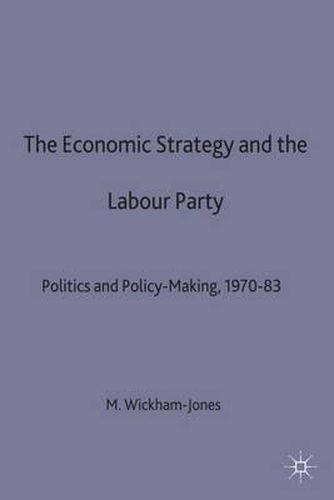Readings Newsletter
Become a Readings Member to make your shopping experience even easier.
Sign in or sign up for free!
You’re not far away from qualifying for FREE standard shipping within Australia
You’ve qualified for FREE standard shipping within Australia
The cart is loading…






This title is printed to order. This book may have been self-published. If so, we cannot guarantee the quality of the content. In the main most books will have gone through the editing process however some may not. We therefore suggest that you be aware of this before ordering this book. If in doubt check either the author or publisher’s details as we are unable to accept any returns unless they are faulty. Please contact us if you have any questions.
‘Any reader wanting to understand the background to Tony Blair’s New Labour project should read this book - the most thoroughly researched, comprehensive and authoritative study of policy and policy-making in Labour’s crisis years when the party’s governing and vote-winning capabilities were seriously undermined.’ Professor Patrick Seyd, University of Sheffield ‘An excellent book - well written, well researched and a very good read…of great interest to students of both modern British and comparative politics.’ - Professor Sven Steinmo, University of Colorado Economic Strategy and the Labour Party examines the nature and development of the Labour party’s economic policy between 1970 and 1983. Drawing on extensive archival research, Mark Wickham-Jones analyses the radical nature of the new proposals adopted by the party in 1973 and charts the opposition of Labour’s leadership to them. The resulting disunity was the central cause of leftwingers’ demands to reform Labour’s constitutional structure and of the party’s election defeat in 1983. Mark Wickham-Jones assesses the nature of Labour’s social democratic objectives and the organisational structure of the party. In the Epilogue he provides a detailed account of the internal reforms under Neil Kinnock’s leadership of the party which have helped to secure the foundations of Labour’s electoral recovery since 1983.
$9.00 standard shipping within Australia
FREE standard shipping within Australia for orders over $100.00
Express & International shipping calculated at checkout
This title is printed to order. This book may have been self-published. If so, we cannot guarantee the quality of the content. In the main most books will have gone through the editing process however some may not. We therefore suggest that you be aware of this before ordering this book. If in doubt check either the author or publisher’s details as we are unable to accept any returns unless they are faulty. Please contact us if you have any questions.
‘Any reader wanting to understand the background to Tony Blair’s New Labour project should read this book - the most thoroughly researched, comprehensive and authoritative study of policy and policy-making in Labour’s crisis years when the party’s governing and vote-winning capabilities were seriously undermined.’ Professor Patrick Seyd, University of Sheffield ‘An excellent book - well written, well researched and a very good read…of great interest to students of both modern British and comparative politics.’ - Professor Sven Steinmo, University of Colorado Economic Strategy and the Labour Party examines the nature and development of the Labour party’s economic policy between 1970 and 1983. Drawing on extensive archival research, Mark Wickham-Jones analyses the radical nature of the new proposals adopted by the party in 1973 and charts the opposition of Labour’s leadership to them. The resulting disunity was the central cause of leftwingers’ demands to reform Labour’s constitutional structure and of the party’s election defeat in 1983. Mark Wickham-Jones assesses the nature of Labour’s social democratic objectives and the organisational structure of the party. In the Epilogue he provides a detailed account of the internal reforms under Neil Kinnock’s leadership of the party which have helped to secure the foundations of Labour’s electoral recovery since 1983.